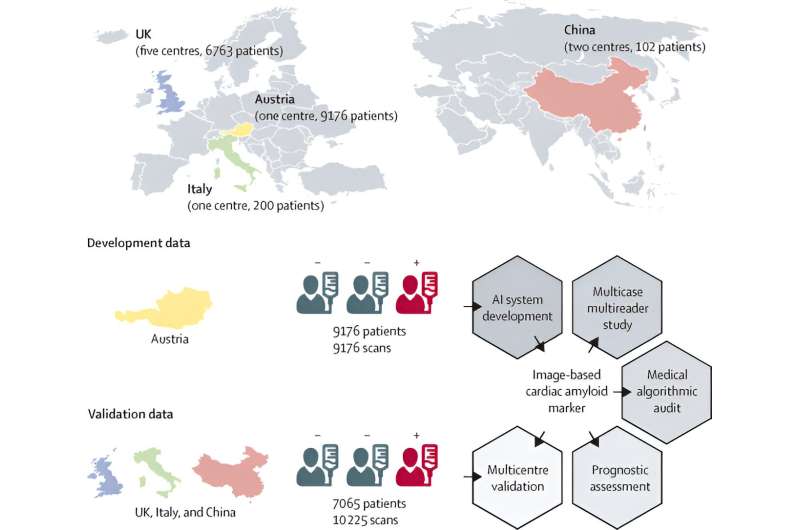This article has been reviewed according to Science X's editorial process and policies. Editors have highlighted the following attributes while ensuring the content's credibility:
fact-checked
trusted source
proofread
Cardiac amyloidosis: New AI system developed for early diagnosis

Cardiac amyloidosis is a serious disease in which abnormal proteins (amyloids) accumulate in the heart muscle and impair heart function. As the disease leads to serious complications such as heart insufficiency and, in many cases, death if left untreated, early diagnosis is essential in order to start treatment in good time.
An international research team led by MedUni Vienna has now developed and tested an AI system that can be used to automatically and reliably detect cardiac amyloidosis. The results of the study have just been published in The Lancet Digital Health.
The new AI system was developed and validated using data sets from 16,000 patients who underwent a scintigraphy imaging examination at nine institutions in Europe and Asia, including Vienna General Hospital, between 2010 and 2020. Scintigraphy is a nuclear medicine procedure that is used to diagnose cancer, thyroid, kidney and heart disease, among other things.
The new AI tool created as part of the research work led by Christian Nitsche (MedUni Vienna's Department of Medicine II) and Marcus Hacker (MedUni Vienna's Department of Biomedical Imaging and Image-guided Therapy) can automatically recognize cardiac amyloidosis during a scintigraphy, thereby significantly speeding up the diagnosis.
At least as reliable as doctors
The AI application was not only developed as part of the large-scale study, but also tested for accuracy compared to the diagnostic performance of doctors. "We found that the system can consistently recognize cardiac amyloidosis at least as reliably as medical experts," report lead authors Clemens Spielvogel and David Haberl from MedUni Vienna's Department of of Biomedical Imaging and Image-guided Therapy.
The research team also analyzed possible correlations between the diagnoses made by the AI system and the occurrence of heart failure and the risk of death. It was found that scintigraphy patients in whom the AI system predicts cardiac amyloidosis have twice the risk of death and a more than 17-fold higher risk of heart failure than patients without such a result.
Cardiac amyloidosis is a rare and often late-diagnosed but serious disease that can hide behind heart insufficiency, for example, more often than previously thought. In 2020, disease-modifying therapies that can halt the progression of cardiac amyloidosis were approved in the European Union for the first time. However, since existing protein deposits and thus the disease cannot be reversed, early and precise diagnosis plays an important role for patients.
"In the future, our findings and the technology we have developed could enable screening for cardiac amyloidosis among all scintigraphy patients, with the AI system evaluating the image data in parallel with doctors," says Clemens Spielvogel.
More information: Clemens P Spielvogel et al, Diagnosis and prognosis of abnormal cardiac scintigraphy uptake suggestive of cardiac amyloidosis using artificial intelligence: a retrospective, international, multicentre, cross-tracer development and validation study, The Lancet Digital Health (2024). DOI: 10.1016/S2589-7500(23)00265-0



















